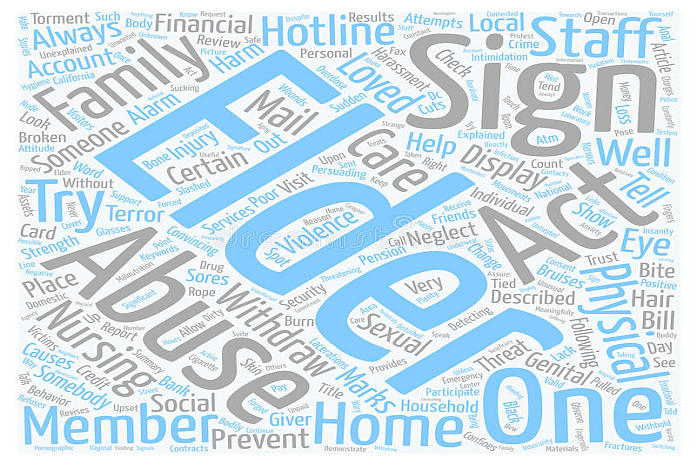By Annan Boodram – The Caribbean Voice
Elderly individuals are often more vulnerable to various forms of abuse because they tend to have assets that they have accumulated through their lives and because they may also experience mental or physical limitations. In many cases, older persons will refuse to seek assistance because they may be in denial, feel ashamed about needing help or worried about losing their independence. Some fear retaliation from abusers.
When the caregivers are their children, elders may feel ashamed that their children are inflicting harm on them or they just may not want their children to get into trouble. As well, during this COVID-19 pandemic, they will have nowhere to go and no one to turn to if they are being abused in a context where most of the world is either under shutdown or stay at home mandates.
Elder self-neglect is defined as the “inability, due to physical or mental impairment or diminished capacity, to perform essential self-care.” This includes an inability to maintain basic daily necessities such as food, clothing, shelter, or medical care, or to manage financial affairs. Neglect is when caregivers (official or unofficial) do not ensure such care or do so in a manner that leaves much to be desired.
Elder neglect or self-neglect warning signs may include unusual weight loss, malnutrition, dehydration; untreated physical problems, such as bed sores; unsanitary living conditions such as dirt, bugs, soiled bedding, and clothes; not taking or being given regular baths or regular change of clothes; not wearing appropriate clothes for the weather and unsafe living conditions such as no running water or lack of food supply.
To prevent elder self-neglect, call (and visit during normal times) as often as possible to check upon them. Monitor their medications to ensure the right amounts are taken at the right times. Make sure the supports they need are in place so they can be able to better take care of themselves. As well, put in place mechanisms for them to quickly and easily access help if needed. This can be done in many ways, such as, for example, enrolling them in a medical alert program.

Abandonment is when the seniors are put out of homes and/or living in the streets. There was one case of a daughter-in-law seeking a restraining order against her father-in-law, thereby resulting in the senior being unable to live in the home. Yet a simple intervention by family and/or friends could have resolved the situation. There was another case of an elder being placed in a basement with no air conditioning in summer and no heat in winter. Meanwhile, the son and daughter-in-law seized all the financial aid the old man obtained, as soon as he accessed them. Concerned neighbors who eventually learned of the situation obtained help for the senior citizen.
Financial abuse includes significant withdrawals from the elder’s accounts; sudden changes in the elder’s financial condition; items or cash missing from the senior’s household; suspicious changes in wills, power of attorney, titles, and policies; addition of names to the senior’s signature card; financial activity the senior couldn’t have undertaken, such as an ATM withdrawal when the account holder is bedridden. To prevent financial abuse, check the elders’ bank accounts and credit card statements for unauthorized transactions and always be aware of all activities relating to their financial matters.
In addition to inflicting physical hurt, physical abuse includes putting the elder to do tasks for which he/she is incapable. In one case an elderly mother in law sent was sent by the daughter-in-law to do grocery. The elder struggled to push the cart to and from the grocery store and on one or more occasions fell on the pavement. Yet, she was in such fear of her daughter-in-law that she begged others not to report. There are also cases of the elderly forced to do household chores or babysit when they are not fully physically and/or mentally capable of doing so.
Physical abuse warning signs include unexplained signs of injury, such as bruises, welts, or scars, especially if they appear symmetrically on two sides of the body; broken bones, sprains, or dislocations; broken eyeglasses or frames; signs of being restrained, such as rope marks on wrists and ankle or caregiver’s reluctant for you to visit the elderly alone.
Emotional abuse warning signs include being subjected to threats, belittlement, humiliation, ridicule, habitual blaming, menace, and terror and being ignored or isolated from friends and family. Sexual abuse warning signs include bruises around breasts or genitals, unexplained vaginal or anal bleeding and torn, stained, or bloody underwear.
If you are an elder who is being abused, tell at least one person – doctor, a friend, or a family member whom you trust. Or call a helpline if you know of one. If you see an older adult being abused or neglected, don’t hesitate to report the situation. In the case of an elder experiencing abuse by a primary caregiver, such as an adult child, do not confront the abuser yourself. This action may put the older person in more danger. Instead, identify the warning signs of abuse or neglect and report them without delay.
If you suspect that the elder is in potentially life-threatening danger call the police or relevant government agencies or departments. We should all become mandatory reporters of elder abuse.
As well, if you have an elder living with you but find it difficult to manage you do have options. If they are physically and mentally able, enroll them in a senior citizen center or daycare. Otherwise, get aides and home visits by nurses through the insurance agencies and doctors’ recommendations, access assisted living for them if they still want and can manage a certain level of independence or place them in nursing homes if they need round the clock care.
However, if you do place your elder in a nursing home please make sure you do your research first to ensure the home does not have a bad reputation As well, speak with home administration so your concerns are addressed. Regularly, make unannounced visits so you can ensure the right care is being given and abuse or neglect does not take place. Always speak in private with your elder to find out of she’s happy and all is well. And, if you feel the need to, ask to be allowed to place a camera in the room of your elder.
In the Caribbean, most of these options may not be available but one option that may work is to have the elder spend time with each adult child during the year so each adult child gets a respite. Also, it is important to understand that at their age it’s rather difficult for seniors to change their behavior, therefore, some tolerance must be displayed.
Another option if there are children at home is that the children can help the elderly grandparent to better manage behavior as the bonds between grandchildren and grandparents are much more emotional as grandchildren usually have a greater tolerance for their grandparents. As well, this relationship can be a learning experience for the children, as grandparents will have a wealth of stories and lessons to share. Elders may be one of the best means to keep children occupied, as they would be more tolerant than parents and more open to engaging with the children.
The vast majority of those dying from COVID-19 are aged 80 or older, but advocates say the pandemic also puts them at risk of elder abuse.
In fact, globally, elder abuse is on the rise at this time. Scammers are already trying to capitalize on the pandemic by offering “miracle cures” and fake tests, misinformation abounds and all sorts of stratagems are being employed. With more seniors at home alone, they may be looking to the internet to get information, and this is where they may fall prey to these scammers and fraudsters.
So staying connected with the elderly (phone, social media, Skype and the like) and ensuring that they are protected from scammers is especially critical. If possible, also occasionally check upon them as they may be struggling but not wanting to burden their loved ones.





